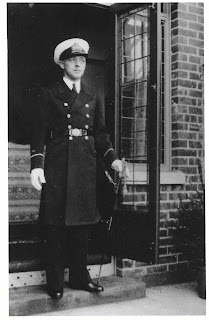Alexander Cockburn was a 33 year old Royal Navy Warrant Engineer on H.M. Submarine Seahorse when he died in January 1940 near Heligoland Bight, Germany in the North Sea. The Seahorse did not have any credited "hits" and was the first British sub lost to enemy action in WWII, and it seems inconclusive when it was officially lost.
Alexander's father, Robert Tough Cockburn, was a Naval Warrant Officer and a Gunner, whose active service ended in 1903. Alexander's mother, Adelaide Tickner, came from a naval family; her father had served in the English Coast Guard and her brother Rowan, was one of the Chief Naval officers in attendance at the German Navy surrender at Scapa Flow, Orkney in 1919. (Rowan would go on be the Chief Constructor of the Portsmouth Dockyards, then Hong Kong Dockyards, retiring from the Sheerness Dockyards.)
Following in the footsteps of of the men in his family, and those of many men in the Portsmouth area, Alexander enlisted in the Royal Navy in 1923 on his 18th birthday for an initial period of 12 years. His first rating, or position, was as an Engine Room Artificer (ERA) Apprentice. An Artificer was basically a ship's engineer, responsible for keeping the all the engines in working order. He would likely have had a few years of technical training prior to enlistment to make him eligible for this type of apprenticeship. He served in the Submarine section, initially on depot ships, advancing from apprentice through the various ranks of ERA.
In 1936 he passed his exams and was promoted to Assistant Warrant Engineer, highly skilled and trained to be able to supervise the operation & repair of all the mechanical and electrical power generating equipment on a ship. The parts of his records I'm able to access show he seems to have been well behaved. The only note I see appears to be a write up for something to do with "excessive tobacco" (so make of that what you will.) Unfortunately I'm not able to access his full service record, at least for free ;) So he must have re-enlisted when his 12 years was up in 1935, and some time after 1936 he started serving on actual submarines.
On December 26, 1939, Alex was aboard the Seahorse when she sailed from her base at Blythe, England on what would be her sixth and final patrol. She was expected to return on January 9th after patrolling around the Heligoland Bight, and the mouth of the Elbe River. When she did not return as scheduled, it was assumed she had hit a mine.
Upon reviewing German records after the war, it was considered possible she could have been sunk by a German Minesweeping flotilla that carried out a prolonged depth charge attack on an unknown submarine on 7 January 1940. Or it was also possible she was rammed and sunk by the German Sperrbrecher IV on 29 December 1939. Since his "official" date of death is listed as 12 January, I have to believe that was the presumed dead date assigned when the sub did not return . I am saddened that we don't know the exact fate of the Seahorse, but it was tragic regardless.
His war memorial is at the Portsmouth Naval Memorial, Panel 37, Col 2.
Alexander Cockburn was the son of Robert & Adelaide Cockburn, husband of Winifred Alice Cockburn, father of James, and my paternal 1st cousin, twice removed.
More info:
https://www.cwgc.org/find-records/find-war-dead/search-results/?Surname=cockburn&Forename=alexander&Initials=&ServiceNum=&Regiment=&ServedWith=United+Kingdom&ServedIn=Navy&WarSelect=2&Unit=Submarine+Seahorse&CountryCommemoratedIn=null&Cemetery=&Rank=&SecondaryRegiment=&AgeOfDeath=0&DateDeathFromDay=1&DateDeathFromMonth=January&DateDeathFromYear=&DateDeathToDay=1&DateDeathToMonth=January&DateDeathToYear=&DateOfDeath=&Honours=null&AdditionalInfo=
https://en.wikipedia.org/wiki/HMS_Seahorse_(98S)




Comments
Post a Comment